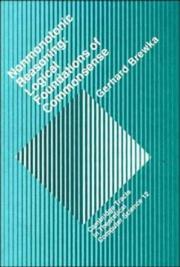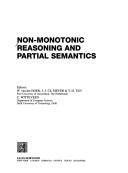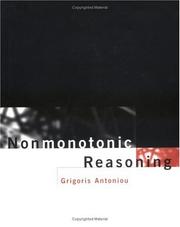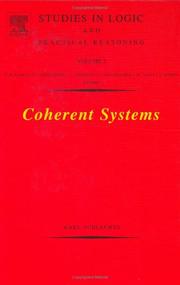| Listing 1 - 10 of 55 | << page >> |
Sort by
|
Book
Year: 1991 Publisher: Cambridge, Massachusetts : [Piscataqay, New Jersey] : MIT Press, IEEE Xplore,
Abstract | Keywords | Export | Availability | Bookmark
 Loading...
Loading...Choose an application
- Reference Manager
- EndNote
- RefWorks (Direct export to RefWorks)
This is the second in a series of workshops that are bringing together researchers from the theoretical end of both the logic programming and artificial intelligence communities to discuss their mutual interests. This workshop emphasizes the relationship between logic programming and non-monotonic reasoning.Luis' Moniz Pereira is Professor in the Department of Computer Science at the Universidade Nova Lisboa, Portugal. Anil Nerode is Professor and Director of the Mathematical Sciences Institute at Cornell University.Topics include: Stable Semantics. Autoepistemic Logic. Abduction. Implementation Issues. Well-founded Semantics. Truth Maintenance. Probabilistic Theories. Applications. Default Logic. Diagnosis. Complexity and Theory. Handling Inconsistency.
Book
ISBN: 3031742095 Year: 2025 Publisher: Cham : Springer,
Abstract | Keywords | Export | Availability | Bookmark
 Loading...
Loading...Choose an application
- Reference Manager
- EndNote
- RefWorks (Direct export to RefWorks)
This book constitutes the refereed proceedings of the 17th International Conference on Logic Programming and Nonmonotonic Reasoning, LPNMR 2024, held in Dallas, TX, USA, during October 11-14, 2024. The 27 full papers and 3 short papers included in this book were carefully reviewed and selected from 48 submissions. They deal with declarative logic programming, non-monotonic reasoning, and knowledge representation, focusing on the design and implementation of logic-based programming languages and database systems. .
Book
ISBN: 1643685309 9781643685304 Year: 2024 Publisher: Amsterdam : IOS Press, Incorporated,
Abstract | Keywords | Export | Availability | Bookmark
 Loading...
Loading...Choose an application
- Reference Manager
- EndNote
- RefWorks (Direct export to RefWorks)
This dissertation by Jonas Philipp Haldimann delves into the field of nonmonotonic reasoning within artificial intelligence, focusing on defeasible rules and their application to feasible and infeasible worlds. The work examines various inductive inference operators, including systems P, Z, and the recently introduced system W, which extends rational closure and c-inference. Haldimann explores the properties of these operators and introduces new concepts such as strong and weak consistency of belief bases. The thesis also investigates syntax splitting postulates and extends these to handle weakly consistent belief bases. System W is evaluated for its compliance with syntax and conditional syntax splitting. This comprehensive study contributes significantly to the understanding of nonmonotonic reasoning, offering theoretical insights and practical implications for AI researchers and practitioners.
Book
Year: 2014 Publisher: Aberdeen Proving Ground, MD : Army Research Laboratory,
Abstract | Keywords | Export | Availability | Bookmark
 Loading...
Loading...Choose an application
- Reference Manager
- EndNote
- RefWorks (Direct export to RefWorks)
Molecular orbitals. --- Density functionals. --- Nonmonotonic reasoning. --- Polynomials.
Book
Year: 1997 Publisher: New York Springer
Abstract | Keywords | Export | Availability | Bookmark
 Loading...
Loading...Choose an application
- Reference Manager
- EndNote
- RefWorks (Direct export to RefWorks)
Logic --- Artificial intelligence --- Nonmonotonic reasoning --- Default reasoning

ISBN: 0521383943 9780521383943 Year: 1991 Volume: 12 Publisher: Cambridge: Cambridge university press,
Abstract | Keywords | Export | Availability | Bookmark
 Loading...
Loading...Choose an application
- Reference Manager
- EndNote
- RefWorks (Direct export to RefWorks)
Introduction -- Formalizing nonmonotonic reasoning -- Nonmonotonic theorem proving -- Inheritance systems -- Nonmonotonic rule based systems -- What has been achieved?
Logic --- Reasoning --- Logique --- Raisonnement --- Nonmonotonic reasoning --- Logic. --- Nonmonotonic reasoning. --- Reasoning. --- Artificial intelligence.

ISBN: 0136251463 9780136251460 Year: 1992 Publisher: New York, N.Y.: Ellis Horwood,
Abstract | Keywords | Export | Availability | Bookmark
 Loading...
Loading...Choose an application
- Reference Manager
- EndNote
- RefWorks (Direct export to RefWorks)
Nonmonotonic reasoning --- Artificial intelligence --- Congresses --- Semantics --- congresses --- congresses. --- Nonmonotonic reasoning - Congresses --- Artificial intelligence - Congresses

ISBN: 9780262267199 0585037035 9780585037035 0262267195 9780262011570 0262011573 Year: 1997 Publisher: Cambridge, Mass. : MIT Press,
Abstract | Keywords | Export | Availability | Bookmark
 Loading...
Loading...Choose an application
- Reference Manager
- EndNote
- RefWorks (Direct export to RefWorks)
Nonmonotonic reasoning provides formal methods that enable intelligent systems to operate adequately when faced with incomplete or changing information. In particular, it provides rigorous mechanisms for taking back conclusions that, in the presence of new information, turn out to be wrong and for deriving new, alternative conclusions instead. Nonmonotonic reasoning methods provide rigor similar to that of classical reasoning; they form a base for validation and verification and therefore increase confidence in intelligent systems that work with incomplete and changing information. Following a brief introduction to the concepts of predicate logic that are needed in the subsequent chapters, this book presents an in depth treatment of default logic. Other subjects covered include the major approaches of autoepistemic logic and circumscription, belief revision and its relationship to nonmonotonic inference, and briefly, the stable and well-founded semantics of logic programs.
Nonmonotonic reasoning. --- Non-monotonic reasoning --- Reasoning --- COMPUTER SCIENCE/Artificial Intelligence

ISBN: 0444517898 9786611119799 1423709349 1281119792 0080502199 9780444517890 9781423709343 9780080502199 Year: 2004 Publisher: Amsterdam Boston Elsevier
Abstract | Keywords | Export | Availability | Bookmark
 Loading...
Loading...Choose an application
- Reference Manager
- EndNote
- RefWorks (Direct export to RefWorks)
Algebraic logic. --- Modality (Logic). --- Nonmonotonic reasoning. --- Semantics --- Mathematical models.
Book
ISBN: 940121011X 9789401210119 1306315379 9781306315371 Year: 2013 Publisher: Amsterdam New York, NY Editions Rodopi
Abstract | Keywords | Export | Availability | Bookmark
 Loading...
Loading...Choose an application
- Reference Manager
- EndNote
- RefWorks (Direct export to RefWorks)
Defeasibility, most generally speaking, means that given some set of conditions A, something else B will hold, unless or until defeating conditions C apply. While the term was introduced into philosophy by legal philosopher H.L.A. Hart in 1949, today, the concept of defeasibility is employed in many different areas of philosophy. This volume for the first time brings together contributions on defeasibility from epistemology (Mikael Janvid, Klemens Kappel, Hannes Ole Matthiessen, Marcus Willaschek, Michael Williams), legal philosophy (Frederick Schauer) and ethics and the philosophy of action (
Defeasible reasoning. --- Law --- Jurisprudence --- Defeasible logic --- Nonmonotonic reasoning --- Philosophy.
| Listing 1 - 10 of 55 | << page >> |
Sort by
|

 Search
Search Feedback
Feedback About UniCat
About UniCat  Help
Help News
News